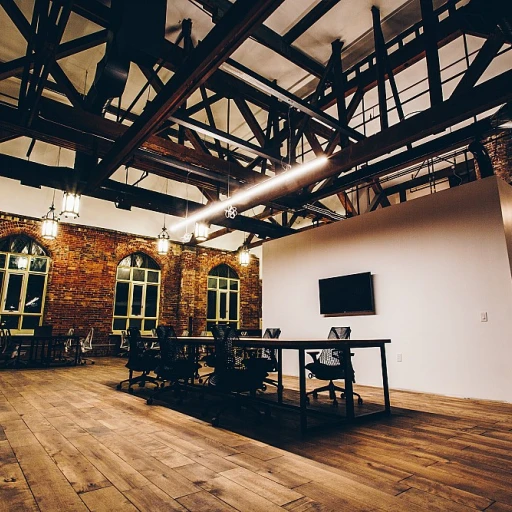
Understanding the Concept of Shared Desks
Exploring the Dynamics of Flexible Workspaces
In the evolving landscape of Indian offices, flexible workspaces have emerged as a dynamic solution to modern business needs. A pivotal aspect of these spaces is the introduction of shared desks, which transforms traditional offices into hubs of collaboration and efficiency. Shared desks are part of a broader "desk sharing" setup, allowing employees to utilize workspaces based on availability. This approach offers a contrast to the conventional dedicated desk model, where an individual desk is the norm. Under the shared desk model, a workspace or office space is no longer tethered to single employees. Instead, it adopts a "hot desking" system where desks are accessible on a need basis. Employees can essentially "book" their desks, promoting an adaptable work environment. This flexibility aligns well with the hybrid work culture, as it encourages a seamless exchange of ideas and bolsters productivity. It eliminates the rigidity of fixed stations and accommodates a vibrant mix of people within a coworking space. Flexible work systems not only prioritize the maximum utilization of the available office space but also present cost-effective alternatives to traditional setups. Businesses can save on expenses related to individual desk allocations and maintenance of extensive cubicle desk arrangements. This is particularly advantageous for start-ups and small industries striving to optimize their resources. In this context, shared office spaces create a conducive environment for team members to forge stronger connections and work more collaboratively. In the freight of demand for shared spaces, it's essential to comprehend how a successful policy can be developed for a workplace. Moreover, key to achieving a successful integration of shared desks is understanding the unique nature of your workspace and employees. The sharing policy needs to be clearly defined, taking into account various parameters, such as the specifics of desk file management and desk booking arrangements. For further insights into how you can become adept at anticipating and meeting office needs in such dynamic spaces, explore more about mastering the art of anticipating needs for optimal workspace management.Benefits of Shared Desks in Indian Workplaces
Advantages of Desk Sharing for Indian Businesses
In the dynamic landscape of Indian offices, businesses are increasingly leaning towards shared desks as an innovative solution to maximize office space utility. The implementation of a desk sharing policy allows for a flexible and cost-effective work environment that can significantly benefit employees and employers alike.
- Space Optimization: By adopting hot desking, an office can accommodate more employees without the need for additional real estate. This not only optimizes existing space but also reduces the costs associated with renting and maintaining more office spaces.
- Increased Collaboration: A flexible workspace promotes a culture of collaboration. Team members from different departments tend to interact more frequently, fostering creative exchange and collaborative projects. Breaking away from the traditional cubicle desks setup, employees can enjoy the benefits of a coworking space culture within the office.
- Enhanced Employee Satisfaction: Offering the freedom to choose where to sit each day can improve job satisfaction and boost productivity. These shared workspaces grant employees the autonomy to select an environment that best suits their work for the day, enhancing overall well-being.
- Cost Efficiency: Implementing desk sharing can substantially cut down on expenses related to unused workstations, desk booking systems, and other overheads. Businesses can redirect these savings towards employee development or enhance their workspace amenities.
Insights into how companies can harness these benefits can be explored further in a recent post discussing innovative workspace solutions. Such adaptations not only enhance operational efficiency but also sustain a dynamic workforce eager to embrace hybrid work models.
Challenges of Implementing Shared Desks
Navigating the Hurdles of Desk Sharing
Implementing shared desks in Indian office environments comes with its set of challenges that require careful navigation. Although the concept encourages a flexible work culture, it does not come without potential roadblocks. One significant challenge is the change in mindset. The traditional office cubicle setup is deeply ingrained in many workplaces, making it difficult for employees to transition smoothly to a shared desk policy. This shift in desk sharing requires understanding and acceptance, both from team members and management. Moreover, ensuring the availability of a desk when needed can be a logistical challenge. Hot desking or shared desks may lead to a situation where an office person finds it difficult to book a dedicated desk, disrupting their workflow. To mitigate this, an efficient desk booking system is essential to prevent conflicts and ensure a seamless work experience. In terms of office space, businesses might struggle with maintaining the balance between open, flexible workspaces and the need for occasional privacy. Shared office setups, while fostering collaboration and team interaction, may lack the personal touch and dedicated space that some employees prefer. There are also operational aspects to consider. Managing shared office resources, such as a desk file or other materials, requires proper control and management. A clear policy on the usage and maintenance of shared office assets encourages team cooperation and upholds respect for others' workspace. Addressing these challenges involves not just changes in physical space, but also alterations in company culture and business practices. Successful integration of shared desk systems can pave the way for a dynamic workplace, blending traditional and modern elements into a cohesive environment.Read more about enhancing office management techniques hereStrategies for Successful Implementation
Crafting an Effective Shared Desk Strategy
Implementing shared desks in an Indian office environment requires a strategic approach to ensure success. Here are some key strategies that can help:
- Define a Clear Sharing Policy: Establishing a clear desk sharing policy is crucial. This policy should outline how desk booking works, the expectations from employees, and how the shared office space is maintained. A well-defined policy helps in managing expectations and reducing confusion among team members.
- Utilize Technology for Desk Booking: Leveraging technology can simplify the process of hot desking. Implementing a desk booking system allows employees to easily reserve their workspace, ensuring a seamless experience. This not only optimizes office space but also enhances employee satisfaction.
- Encourage a Culture of Flexibility: To make the most of shared desks, fostering a culture of flexible work is essential. Encourage team members to embrace the benefits of coworking spaces and hybrid work models. This cultural shift can lead to increased collaboration and innovation.
- Provide Dedicated Zones: While shared desks promote flexibility, having dedicated zones for specific tasks or teams can be beneficial. This approach balances the need for collaboration with the requirement for focused work, enhancing overall productivity.
- Regular Feedback and Adaptation: Regularly gathering feedback from employees about the shared desk experience can provide insights into what works and what doesn’t. Use this feedback to make necessary adjustments, ensuring the strategy remains effective and relevant.
By focusing on these strategies, businesses can successfully implement shared desks, creating a dynamic and efficient workspace that meets the needs of modern employees.












